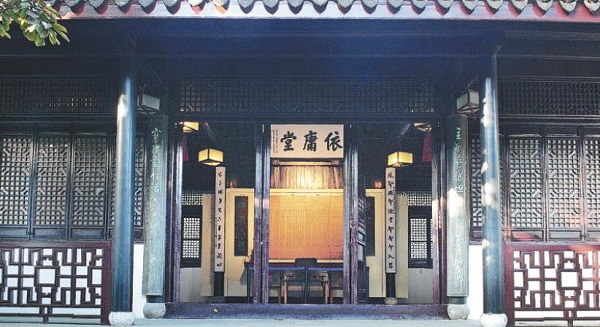Modern approach promotes old ways
Couplets stating that scholars should use their knowledge for the betterment of the nation are displayed in Yiyong Hall at the academy. [Photo by Yao Liping/for China Daily]
In the past, visitors took photos while enjoying a leisurely stroll through the academy grounds. Now, they can embark on a full day's activities, starting with a tai chi class in the morning followed by a gastronomical experience that involves savoring local snacks and desserts while sipping exquisite blends of tea.
Arts enthusiasts can also enjoy folk music performances and local opera shows in the mornings and afternoons. Bamboo sculpture and Wuxi-style embroidery feature among the lectures given by local masters of intangible cultural heritage in the afternoons.
Visitors who love to work with their hands can choose from six classes-pottery, metal, stone, wood, leather and plant-weaving-based on the Confucian classic text The Book of Rites.
The new approach adopted by the academy is in line with the concept put forward by President Xi Jinping to keep Chinese history and culture alive and strong, and to preserve the roots of the Chinese ethos.
Xi, who is also general secretary of the Communist Party of China's Central Committee, has on many occasions underlined the significance of preserving traditional Chinese culture, noting that historical and cultural heritage is an irreplaceable precious resource.
During Xi's trip to Fujian province last month, he learned of the achievements of renowned 12th century philosopher Zhu Xi, who exemplified the merits of Confucian ideologies.
During his visit Xi said: "Without this 5,000-year Chinese civilization, how could we find something with Chinese characteristics? And without Chinese characteristics, how could we find the path that has led us to today's success?"


 WeChat
WeChat
 Weibo
Weibo